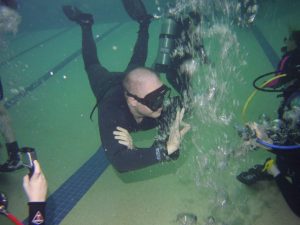The World of Technical Scuba Diving and eCCR


Scuba diving is a captivating adventure that allows enthusiasts to explore the hidden treasures of the underwater world. While traditional scuba diving is accessible and widely practiced, the world of technical scuba training and electronic Closed-Circuit Rebreathers (eCCR) takes diving to a new level. In this article, we will delve into the exciting realm of specialized scuba training and the revolutionary technology of eCCR, providing an in-depth look at the benefits, challenges, and heightened diving experience they offer.
Technical Scuba Diving: Going Beyond the Basics
Technical scuba diving, often referred to as “tec diving,” is a specialized form of scuba diving that goes beyond the boundaries of recreational diving. Tec divers undertake advanced training to explore deeper depths, stay submerged longer, and navigate challenging underwater environments. This type of diving requires more skill, knowledge, and equipment.
One of the defining characteristics of TC diving is the use of specialized equipment, such as mixed gases (nitrox and trimix), redundant gear, and advanced breathing apparatus like rebreathers. These advanced technologies allow divers to venture deeper and stay submerged longer while maintaining a higher level of safety and control.
The Electronic Closed-Circuit Rebreather (eCCR)
An electronic Closed-Circuit Rebreather (eCCR) is a groundbreaking advancement in scuba diving technology. Unlike traditional open-circuit scuba systems, rebreathers recycle a diver’s exhaled breath by removing carbon dioxide and adding oxygen to create a breathing mixture that can be reused. This technology not only conserves gas but also extends the duration of dives and enables a more silent, bubble-free experience, ideal for getting closer to marine life.
The electronic component of eCCRs provides real-time monitoring and control of gas mixtures, depth, and decompression data. This level of automation ensures a safer and more streamlined diving experience.
Benefits of Technical Scuba Training and eCCR
Extended Dive Times: Tec divers using eCCRs can stay underwater for significantly more extended periods than traditional scuba equipment, allowing for more in-depth exploration of underwater environments.
Deeper Dives: Technical scuba training allows divers to venture deeper into the ocean, reaching inaccessible depths to recreational divers. This opens up new opportunities for discovering unique marine life and submerged wrecks.
Improved Gas Management: Tec divers learn to manage a variety of gas mixtures, including nitrox and trimix, which is essential for deep dives and decompression stops.
Enhanced Safety: Technical divers undergo rigorous training in dive planning, decompression procedures, and problem-solving, making them better prepared to handle challenging situations underwater.
Silent diving: eCCRs provide a nearly noiseless diving experience, which can be especially valuable for photographers and researchers who want to get close to marine life without disturbing it.
Real-time Monitoring: The electronic systems in eCCRs offer real-time monitoring of critical parameters. Reducing the risk of human error and improving dive safety.
Challenges and Considerations
While technical scuba diving and eCCRs offer exciting opportunities, they also come with specific challenges and considerations:
Training: Technical diving requires advanced training and certification. Divers must be physically fit and have extensive diving experience before pursuing tec diving.
Equipment Costs: Specialized equipment, including eCCRs, can be expensive. However, for serious divers, the investment is often justified by the extended capabilities and enhanced experiences.
Gas Management: Tec divers must become proficient in gas management and handling various gas mixtures. This adds complexity to dive planning and execution.
Risk Management: Tec divers must have a deep understanding of risk management and be prepared for the unexpected. This includes having backup plans and redundant equipment.
Physical and Mental Demands: Tec diving can be physically and mentally demanding. Divers should be in good physical condition and able to handle the added stress of deep and challenging dives.
Exploring the Wonders of the Deep
Technical scuba training and eCCRs offer divers the opportunity to explore the ocean’s depths in ways that were once reserved for a select few. From diving deeper into the abyss to enjoying longer, quieter dives, these advancements provide a unique and exhilarating underwater experience.
The underwater world is home to incredible marine life, stunning coral reefs, and captivating shipwrecks. For those with a passion for scuba diving and a desire to go beyond the limits of recreational diving, technical scuba training and eCCR technology unlock a realm of possibilities.
As with any adventurous pursuit, safety and responsibility are paramount. Divers should invest in proper training, equipment, and practice to ensure a successful and fulfilling tec diving experience. Whether you’re drawn to the mysterious depths of the ocean or the serene beauty of the underwater world. Technical scuba training and eCCR technology can take your diving adventures to new heights—literally and figuratively.
